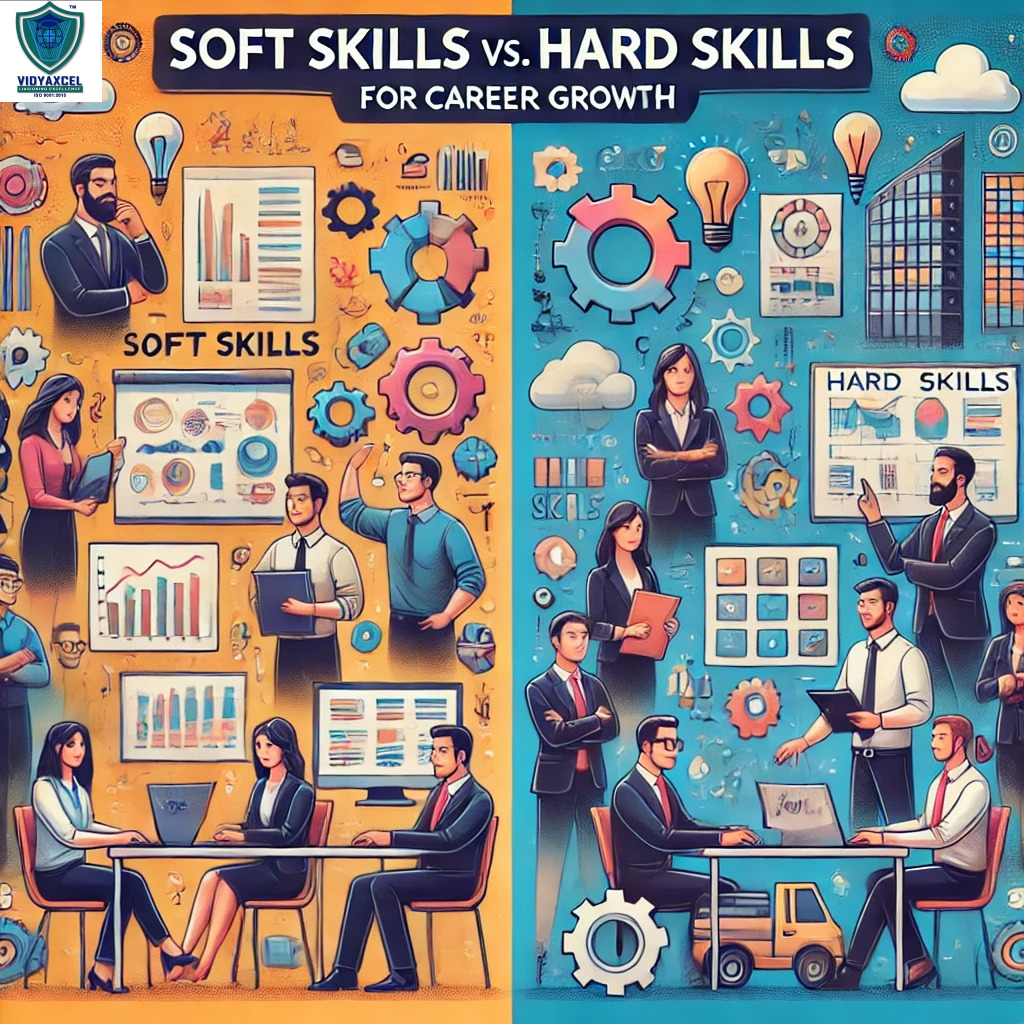Blog Details

20Feb
Soft Skills vs. Hard Skills: What Really Matters for Career Growth
Introduction
In today’s fast-evolving job market, career success depends on more than just technical expertise. While hard skills (such as coding, accounting, or data analysis) help you secure a job, soft skills (like communication, teamwork, and adaptability) determine how far you can grow in your career. Employers increasingly seek candidates who not only possess the right knowledge but also the ability to collaborate, solve problems, and lead effectively. So, which matters more—hard skills or soft skills? The truth is, both play a crucial role, but mastering the right balance can give you a competitive edge.
What Are Hard Skills?
Hard skills are the technical abilities and knowledge required for a specific job. They are measurable, teachable, and often acquired through education, training, or experience.
Examples of Hard Skills:
- Programming languages (Python, Java, C++)
- Data analysis and statistics
- Graphic design and video editing
- Financial accounting and budgeting
- Foreign language proficiency
- SEO and digital marketing
Why Hard Skills Matter:
- They qualify you for a job in a specific industry.
- They are often the first thing employers look for on a resume.
- They can be certified and easily measured.
However, while hard skills get your foot in the door, they are not always enough for long-term career success.
What Are Soft Skills?
Soft skills refer to interpersonal, emotional, and social abilities that determine how well you work with others and navigate workplace challenges. These skills are harder to measure but are essential for career growth.
Examples of Soft Skills:
- Communication and active listening
- Leadership and teamwork
- Problem-solving and critical thinking
- Emotional intelligence and adaptability
- Time management and organization
- Negotiation and conflict resolution
Why Soft Skills Matter:
- They help in collaboration and teamwork.
- They make career transitions and promotions easier.
- They improve leadership and people management abilities.
A person with strong hard skills but weak soft skills may struggle to advance in their career, as success is not just about what you know, but also how you work with others.
Soft Skills vs. Hard Skills: Which Matters More?
| Feature | Hard Skills | Soft Skills |
|---|---|---|
| Definition | Technical knowledge and expertise | Interpersonal and emotional intelligence |
| Measurement | Can be tested and certified | Harder to quantify but observed in actions |
| Acquisition | Learned through education, training, and experience | Developed through practice, feedback, and experience |
| Importance for Hiring | Essential for securing a job | Crucial for teamwork and long-term success |
| Impact on Career Growth | Helps in getting hired | Helps in promotions and leadership roles |
| Job Security | Can become outdated with technology changes | Always valuable in any role and industry |
Both are equally important, but soft skills often outweigh hard skills for career growth because they determine how well you work with people, handle challenges, and adapt to changes.
How to Develop Soft & Hard Skills
Ways to Improve Hard Skills:
- Take online courses (Udemy, Coursera, LinkedIn Learning)
- Earn industry certifications
- Gain hands-on experience through internships or projects
- Stay updated with industry trends
Ways to Improve Soft Skills:
- Practice public speaking and effective communication
- Work on teamwork and leadership in group settings
- Develop emotional intelligence through self-awareness and empathy
- Take on responsibilities that require problem-solving and adaptability
Employers increasingly seek professionals who excel in both areas. Technical expertise gets you the job, but soft skills ensure you thrive in it.
Conclusion
Both hard skills and soft skills are essential for career growth, but while hard skills open doors, soft skills keep them open. Your technical abilities qualify you for a job, but your interpersonal skills determine how well you perform, collaborate, and advance in your field. In an era of rapid change and automation, developing a strong mix of both ensures long-term career success. The key is to continuously learn, adapt, and refine both skill sets to stay ahead in any industry.
FAQ's
Which is more important for career growth: soft skills or hard skills?
Both are essential, but soft skills often determine long-term career success. Hard skills help you get a job, but soft skills help you thrive, grow, and move into leadership roles.
Can I get a job with hard skills alone?
Yes, but without soft skills, you may struggle to collaborate, communicate effectively, or adapt to changes, which can limit promotions and career growth.
Why do employers value soft skills so much?
Soft skills determine how well you work in a team, handle stress, lead projects, and solve problems—qualities that impact workplace culture and productivity.
Can soft skills be measured or certified?
Unlike hard skills, soft skills can’t be easily measured through tests or certifications. However, employers assess them through behavior, interactions, and performance in real-world situations.
Do soft skills become more important at higher career levels?
Yes! As you advance in your career, technical expertise becomes less important than leadership, decision-making, and strategic thinking—all of which rely on soft skills.
Our Office: West Bengal, Maharashtra & Delhi.
For More Infomation about admission in Medical, Engineering, Management & Study in Overseas Details.
View Current Study Overseas, Medical, Engineering & Management Admission Details Video.





